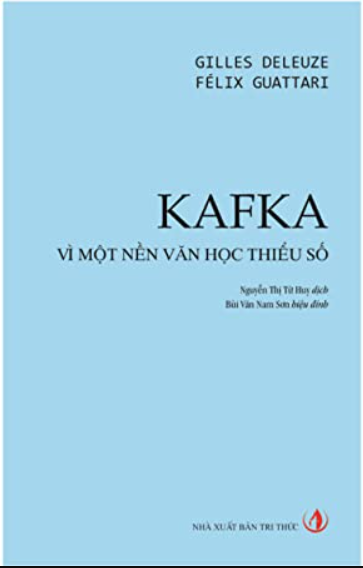What do you think?
Rate this book


244 pages, Paperback
First published January 1, 1975
So many dead writers must have wept over what was written about them. I hope that Kafka enjoyed the book that we wrote about him
The judges, commissioners, bureaucrats, and so on, are not substitutes for the father; rather, it is the father who is a condensation of all these forces that he submits to and that he tries to get his son to submit to (p12)
Diaries, 1921: "Metaphors are one of the things that makes me despair of literature." Kafka deliberately kills all metaphor, all symbolism, all signification, no less than all designation. Metamorphosis is the contrary of metaphor.
The danger of the diabolical pact, of diabolical innocence, is not guilt but the trap, the impasse within the rhizome, the closing of all escape, the burrow that is blocked everywhere. Fear. The devil himself is caught in the trap. One allows oneself to be re-Oedipalized not by guilt but by fatigue, by a lack of invention, by the imprudence of what one has started, by the photo, by the police—diabolical powers from faraway. Thus innocence no longer matters. The formula of diabolical innocence saves you from guilt but does not save you from the photocopy of the pact and the condemnation that results from it. The danger is not feeling guilt as a neurosis, as a state, but judging guilt as a Trial. And that's the fatal outcome of the letter; the "letter to the father" is a trial that closes in on Kafka; the letters to Felice turn into a mock Trial, with an entire tribunal, family, friends, defense, accusation. Kafka has a presentiment of this from the start, since he is writing "The Judgment" at the same time he begins the letters to Felice. But "The Judgment" comes from the great fear that a letter machine will entrap the author. (p32 i think)
We will term "low" or "neurotic" any reading that turns genius into anguish, into tragedy, into a "personal concern." For example, Nietzsche, Kafka, Beckett, whomever: those who don't read them with many involuntary laughs and political tremors are deforming everything. (footnote to ch4).Awesome, totally agree
If everything, everyone, is part of justice, if everyone is an auxiliary of justice, from the priest to the little girls, this is not because of the transcendence of the law but because of the immanence of desire. p50Ok so it's all about desire as an endless and contiguous process. its not about bureaucracy or tyranny or guilt it's all intensities of desire. got it
...
The Trial is the dismantling of all transcendental justifications. There is nothing to judge vis-a-vis desire; the judge himself is completely shaped by desire. Justice is no more than the immanent process of desire. The process is itself a continuum, but a continuum made up of contiguities. The contiguous is not opposed to the continuous —quite the contrary, it is a local and indefinitely prolongable version of the continuous. Thus, it is also the dismantling of the continuous-always an office next door, always the contiguous room(p51)
Everything Kafka does works to an exactly opposite end, and this is the principle behind his antilyricism, his anti-aestheticism: "Grasp the world," instead of extracting impressions from it; work with objects, characters, events, in reality, and not in impressions. Kill metaphor. Aesthetic impressions, sensations, or imaginings still exist for themselves in Kafka's first essays where a certain influence of the Prague school is at work. But all of Kafka's evolution will consist in effacing them to the benefit of a sobriety, a hyper-realism, a machinism that no longer makes use of them. (last chapter)yes i agree. metaphors are a nono, its all immediately there.
K becomes increasingly aware that the transcendental imperial law refers in fact to an immanent justice, to an immanent assemblage of justice. Paranoid law gives way to a schizo-law; immediate resolution gives way to an unlimited deferral; the transcendence of duty in the social field gives way to a nomadic immanence of desire that wanders all over this field. This is made explicit in "The Great Wall of China," without being developed in any way: there are nomads who give evidence of another law, another assemblage, and who sweep away everything in their journey from the frontier to the capitol, the emperor and his guards having taken refuge behind the windows and the screens. Thus, Kafka no longer operates by means of infinite-limited-discontinuous but by finite-contiguous-continuous-unlimited. (Continuity will always seem to him to be the condition of writing, not only for writing the novels but also for writing the short stories such as "The Verdict." The unfinished work is no longer a fragmentary work but an unlimited one). (last chapter)
Even the key words of the Deleuze-Guattari procedure, words like rhizome, lines of escape, assemblage, become battle-sites for a process of deterritorialization as the authors violate their own proprietary authorship of terms and make the words tremble, stutter. […] Seeming to refer to fixed conceptual fields, the words seem initially territorialized, literally the guardians of two inviolate and irrevocably distinct conceptual realms. But a kind of sliding contagion occurs, and through the course of the book, each term comes to refer to elements within the original territorial space of the other term. So, to a large extent, the translation lets the words slide […] each engaging in unsystematic war-machine attacks on the other. (xxvii)Of course, the translator’s reading of the notion of ‘territorialization’ does quite a bit of work in territorializing ‘territorialization’ itself, which is kinda cool.